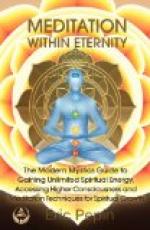“I saw Self, or Life, symbolized all about me as a limitless, fathomless and lonely sea. I took a handful and threw it into the grey silence of ocean air, and it returned at once as a swift and potent flame, a red fire crested with brown sunrise, rushing from between the lips of sky and sea to the sound as of innumerable trumpets.”
“In another dream he visited a land where there was no more war, where all men and women were equal; where humans, birds and beasts were no longer at enmity, or preyed on one another. And he was told that the young men of the land had to serve two years as missionaries to those who lived at the uttermost boundaries. ‘To what end?’ he asked. ’To cast out fear, our last enemy.’ In the house of his host he was struck by the beauty of a framed painting that seemed to vibrate with rich colors. ‘Who painted that?’ he asked. His host smiled, ’We have long since ceased to use brushes and paints. That is a thought projected from the artist’s brain, and its duration will be proportionate with its truth.’”
In explanation of why he chose to put out so much of the creative work of his brain under the signature of a woman, and how he happened to use the name Fiona Macleod, Sharp explained that when he began to realize how strong was the feminine element in the book Pharais, he decided to issue the book under a woman’s name and Fiona Macleod “flashed ready-made” into his mind. “My truest self, the self who is below all other selves must find expression,” he explained. The Self that is above the other self is what he should have said. The following extracts are from the Fiona Macleod phase of William Sharp and are characteristic of the Self, as evidenced in all instances of Illumination, particularly as these expressions refer to the nothingness of death, and the beauty and power of Love. “Do not speak of the spiritual life as ‘another life’; there is no ‘other life’; what we mean by that, is with us now. The great misconception of death is that it is the only door to another world.” This testimony corroborates that of Whitman as well as of St. Paul, notwithstanding all the centuries that separate the two. St. Paul did not say that man will have a spiritual body, but that he has a spiritual body as well as a corporeal body.
After the experience of his illumination, William Sharp, writing as Fiona Macleod constantly testified to the ever-present reality of his spiritual life; a life far more real to him than the sense-conscious life although he alluded to it as his dream. In one place he says:
“Now truly, is dreamland no longer a phantasy of sleep, but a loveliness so great that, like deep music, there could be no words wherewith to measure it, but only the breathless unspoken speech of the soul upon whom has fallen the secret dews.”
Of the impossibility of adequately explaining the mystery of Illumination and the sensations it inspires, he says, speaking through the Self of Fiona Macleod: “I write, not because I know a mystery, and would reveal it, but because I have known a mystery and am to-day as a child before it, and can neither reveal nor interpret it.”




